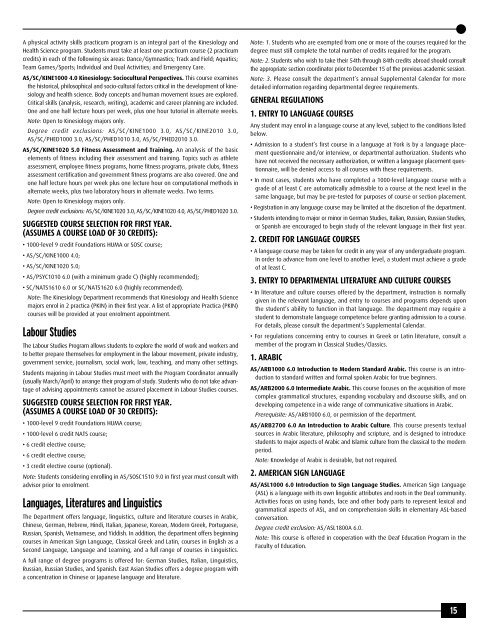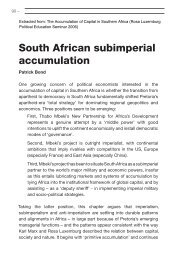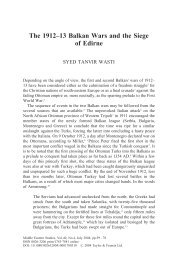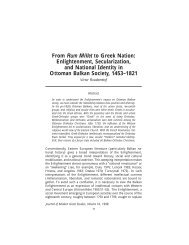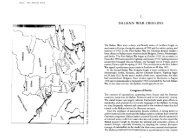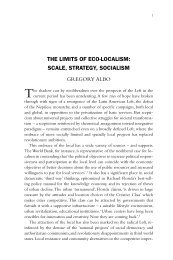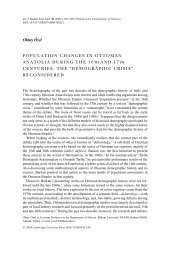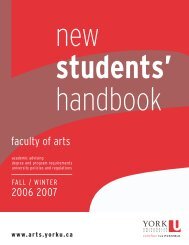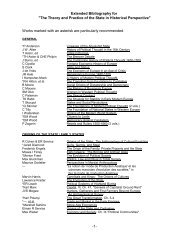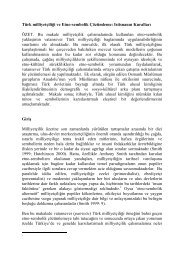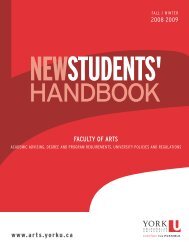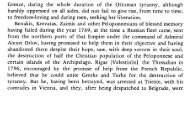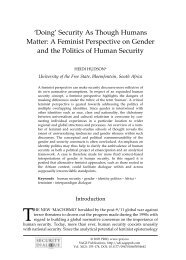FYCSG 05/06 REV2 - Faculty of Arts - York University
FYCSG 05/06 REV2 - Faculty of Arts - York University
FYCSG 05/06 REV2 - Faculty of Arts - York University
You also want an ePaper? Increase the reach of your titles
YUMPU automatically turns print PDFs into web optimized ePapers that Google loves.
A physical activity skills practicum program is an integral part <strong>of</strong> the Kinesiology and<br />
Health Science program. Students must take at least one practicum course (2 practicum<br />
credits) in each <strong>of</strong> the following six areas: Dance/Gymnastics; Track and Field; Aquatics;<br />
Team Games/Sports; Individual and Dual Activities; and Emergency Care.<br />
AS/SC/KINE1000 4.0 Kinesiology: Sociocultural Perspectives. This course examines<br />
the historical, philosophical and socio-cultural factors critical in the development <strong>of</strong> kinesiology<br />
and health science. Body concepts and human movement issues are explored.<br />
Critical skills (analysis, research, writing), academic and career planning are included.<br />
One and one half lecture hours per week, plus one hour tutorial in alternate weeks.<br />
Note: Open to Kinesiology majors only.<br />
Degree credit exclusions: AS/SC/KINE1000 3.0, AS/SC/KINE2010 3.0,<br />
AS/SC/PHED1000 3.0, AS/SC/PHED1010 3.0, AS/SC/PHED2010 3.0.<br />
AS/SC/KINE1020 5.0 Fitness Assessment and Training. An analysis <strong>of</strong> the basic<br />
elements <strong>of</strong> fitness including their assessment and training. Topics such as athlete<br />
assessment, employee fitness programs, home fitness programs, private clubs, fitness<br />
assessment certification and government fitness programs are also covered. One and<br />
one half lecture hours per week plus one lecture hour on computational methods in<br />
alternate weeks, plus two laboratory hours in alternate weeks. Two terms.<br />
Note: Open to Kinesiology majors only.<br />
Degree credit exclusions: AS/SC/KINE1020 3.0, AS/SC/KINE1020 4.0, AS/SC/PHED1020 3.0.<br />
SUGGESTED COURSE SELECTION FOR FIRST YEAR.<br />
(ASSUMES A COURSE LOAD OF 30 CREDITS):<br />
• 1000-level 9 credit Foundations HUMA or SOSC course;<br />
• AS/SC/KINE1000 4.0;<br />
• AS/SC/KINE1020 5.0;<br />
• AS/PSYC1010 6.0 (with a minimum grade C) (highly recommended);<br />
• SC/NATS1610 6.0 or SC/NATS1620 6.0 (highly recommended).<br />
Note: The Kinesiology Department recommends that Kinesiology and Health Science<br />
majors enrol in 2 practica (PKIN) in their first year. A list <strong>of</strong> appropriate Practica (PKIN)<br />
courses will be provided at your enrolment appointment.<br />
Labour Studies<br />
The Labour Studies Program allows students to explore the world <strong>of</strong> work and workers and<br />
to better prepare themselves for employment in the labour movement, private industry,<br />
government service, journalism, social work, law, teaching, and many other settings.<br />
Students majoring in Labour Studies must meet with the Program Coordinator annually<br />
(usually March/April) to arrange their program <strong>of</strong> study. Students who do not take advantage<br />
<strong>of</strong> advising appointments cannot be assured placement in Labour Studies courses.<br />
SUGGESTED COURSE SELECTION FOR FIRST YEAR.<br />
(ASSUMES A COURSE LOAD OF 30 CREDITS):<br />
• 1000-level 9 credit Foundations HUMA course;<br />
• 1000-level 6 credit NATS course;<br />
• 6 credit elective course;<br />
• 6 credit elective course;<br />
• 3 credit elective course (optional).<br />
Note: Students considering enrolling in AS/SOSC1510 9.0 in first year must consult with<br />
advisor prior to enrolment.<br />
Languages, Literatures and Linguistics<br />
The Department <strong>of</strong>fers language, linguistics, culture and literature courses in Arabic,<br />
Chinese, German, Hebrew, Hindi, Italian, Japanese, Korean, Modern Greek, Portuguese,<br />
Russian, Spanish, Vietnamese, and Yiddish. In addition, the department <strong>of</strong>fers beginning<br />
courses in American Sign Language, Classical Greek and Latin, courses in English as a<br />
Second Language, Language and Learning, and a full range <strong>of</strong> courses in Linguistics.<br />
A full range <strong>of</strong> degree programs is <strong>of</strong>fered for: German Studies, Italian, Linguistics,<br />
Russian, Russian Studies, and Spanish. East Asian Studies <strong>of</strong>fers a degree program with<br />
a concentration in Chinese or Japanese language and literature.<br />
Note: 1. Students who are exempted from one or more <strong>of</strong> the courses required for the<br />
degree must still complete the total number <strong>of</strong> credits required for the program.<br />
Note: 2. Students who wish to take their 54th through 84th credits abroad should consult<br />
the appropriate section coordinator prior to December 15 <strong>of</strong> the previous academic session.<br />
Note: 3. Please consult the department’s annual Supplemental Calendar for more<br />
detailed information regarding departmental degree requirements.<br />
GENERAL REGULATIONS<br />
1. ENTRY TO LANGUAGE COURSES<br />
Any student may enrol in a language course at any level, subject to the conditions listed<br />
below.<br />
• Admission to a student’s first course in a language at <strong>York</strong> is by a language placement<br />
questionnaire and/or interview, or departmental authorization. Students who<br />
have not received the necessary authorization, or written a language placement questionnaire,<br />
will be denied access to all courses with these requirements.<br />
• In most cases, students who have completed a 1000-level language course with a<br />
grade <strong>of</strong> at least C are automatically admissible to a course at the next level in the<br />
same language, but may be pre-tested for purposes <strong>of</strong> course or section placement.<br />
• Registration in any language course may be limited at the discretion <strong>of</strong> the department.<br />
• Students intending to major or minor in German Studies, Italian, Russian, Russian Studies,<br />
or Spanish are encouraged to begin study <strong>of</strong> the relevant language in their first year.<br />
2. CREDIT FOR LANGUAGE COURSES<br />
• A language course may be taken for credit in any year <strong>of</strong> any undergraduate program.<br />
In order to advance from one level to another level, a student must achieve a grade<br />
<strong>of</strong> at least C.<br />
3. ENTRY TO DEPARTMENTAL LITERATURE AND CULTURE COURSES<br />
• In literature and culture courses <strong>of</strong>fered by the department, instruction is normally<br />
given in the relevant language, and entry to courses and programs depends upon<br />
the student’s ability to function in that language. The department may require a<br />
student to demonstrate language competence before granting admission to a course.<br />
For details, please consult the department’s Supplemental Calendar.<br />
• For regulations concerning entry to courses in Greek or Latin literature, consult a<br />
member <strong>of</strong> the program in Classical Studies/Classics.<br />
1. ARABIC<br />
AS/ARB1000 6.0 Introduction to Modern Standard Arabic. This course is an introduction<br />
to standard written and formal spoken Arabic for true beginners.<br />
AS/ARB2000 6.0 Intermediate Arabic. This course focuses on the acquisition <strong>of</strong> more<br />
complex grammatical structures, expanding vocabulary and discourse skills, and on<br />
developing competence in a wide range <strong>of</strong> communicative situations in Arabic.<br />
Prerequisite: AS/ARB1000 6.0, or permission <strong>of</strong> the department.<br />
AS/ARB2700 6.0 An Introduction to Arabic Culture. This course presents textual<br />
sources in Arabic literature, philosophy and scripture, and is designed to introduce<br />
students to major aspects <strong>of</strong> Arabic and Islamic culture from the classical to the modern<br />
period.<br />
Note: Knowledge <strong>of</strong> Arabic is desirable, but not required.<br />
2. AMERICAN SIGN LANGUAGE<br />
AS/ASL1000 6.0 Introduction to Sign Language Studies. American Sign Language<br />
(ASL) is a language with its own linguistic attributes and roots in the Deaf community.<br />
Activities focus on using hands, face and other body parts to represent lexical and<br />
grammatical aspects <strong>of</strong> ASL, and on comprehension skills in elementary ASL-based<br />
conversation.<br />
Degree credit exclusion: AS/ASL1800A 6.0.<br />
Note: This course is <strong>of</strong>fered in cooperation with the Deaf Education Program in the<br />
<strong>Faculty</strong> <strong>of</strong> Education.<br />
15


